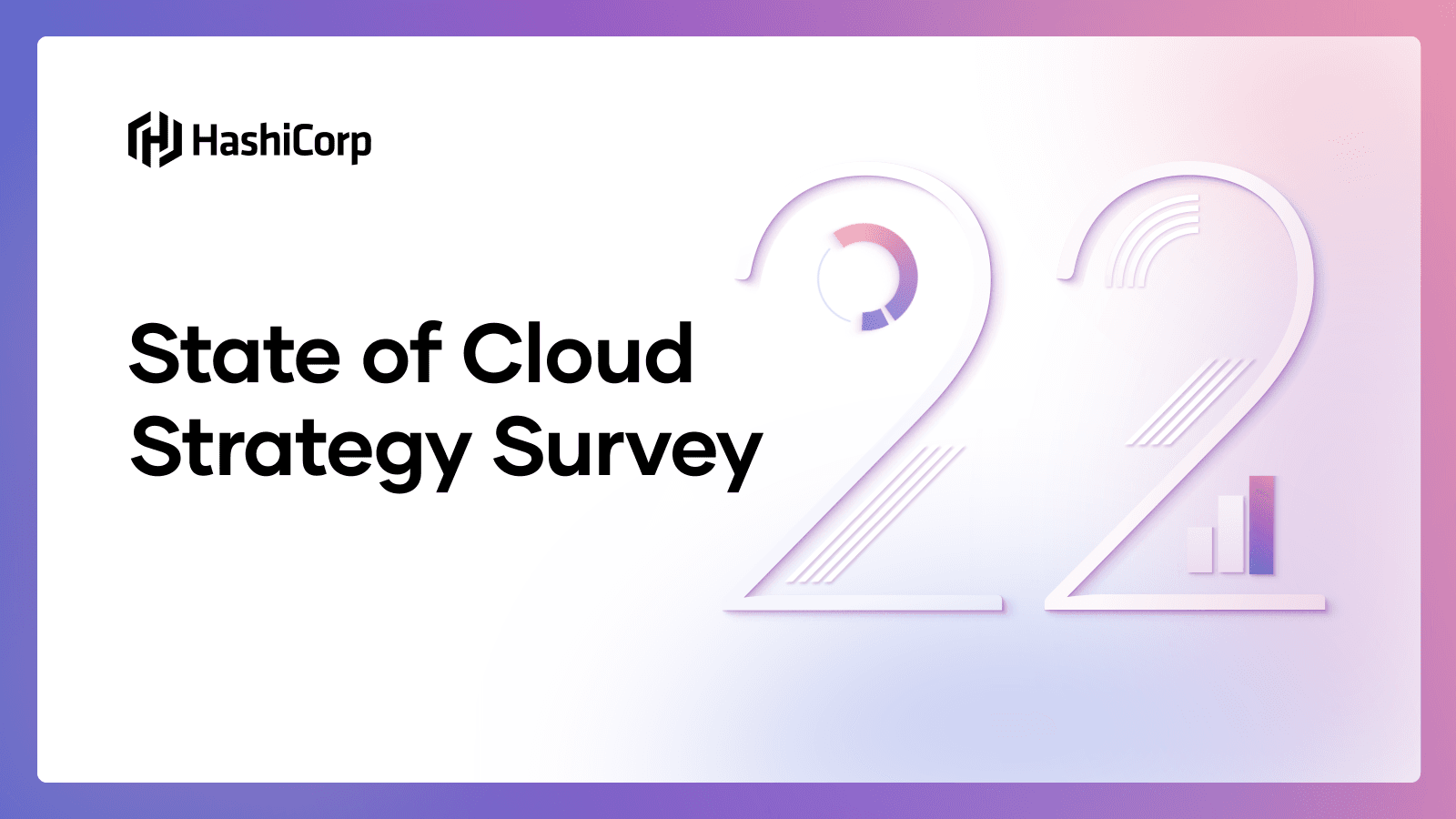The second annual HashiCorp State of Cloud Strategy Survey is out, and the results are very clear: multi-cloud adoption keeps growing, and the rise of cloud platform teams is already helping enterprises derive significant business benefits from the strategy. Expanding upon our inaugural survey in 2021, this year’s survey results highlight the ubiquity of multi-cloud approaches, the ongoing importance of cloud security, and how the shortage of required skills is affecting the way companies operationalize multi-cloud. Breaking new ground, the 2022 survey delves into the increasingly critical role played by cloud platform teams and why so many organizations are still wasting money in the cloud.
For the 2022 State of Cloud Strategy survey, we commissioned Forrester Consulting to conduct a survey of more than 1,000 technology practitioners and decision makers in companies with more than 1,000 employees, from a variety of industries around the world. As part of this year’s survey, Forrester shares its key findings, analysis, and recommendations for enterprises in its Unlocking Multicloud’s Operational Potential study, available for download on the interactive HashiCorp State of Cloud Strategy survey microsite.
More on Forrester’s conclusions shortly, but just like last year, we boiled down the 2022 HashiCorp State of Cloud Strategy survey results into five key numbers:

Let’s take a closer look at those big numbers.
»Platform Teams Are Helping Drive Multi–Cloud Success
According to the survey, 81% of respondents are already using more than one cloud, or plan to do so within the next year. But that’s not really the big news. More importantly, of the companies that have adopted a multi-cloud operating model, 90% report that the strategy has already helped advance or achieve their company’s business goals. And although our survey methodology differed somewhat from year to year, that’s a huge jump from 2021, when just 53% of respondents made that claim.
One reason for the increase in multi-cloud success is likely the concurrent rise in centralized cloud groups and functions, such as cloud platform teams or Cloud Centers of Excellence (CCoE). Almost 9 out of 10 respondents have such a function, and of those that don’t, only a quarter have extensive cloud usage and don’t see the need for one.
Perhaps that’s because platform teams perform so many critical functions throughout the organization. In fact, while standardizing cloud services, creating and sharing best practices and policies, and centralizing cloud security and compliance top the list of platform team responsibilities, more than three-quarters of respondents rely on their platform teams for all 15 of the functions we asked about. That includes a wide variety of critical responsibilities — everything from creating cloud management and operational policies, to developing and distributing cloud best practices, to architecting cloud solutions and running cloud operations.
»Challenges Around Security, Skills, and Spending Remain
Of course, that doesn’t mean everything is perfect in multi-cloud environments. Almost 9 out of 10 respondents still worry about cloud security, making it the top driver of cloud success, topping even the ability to deliver uptime and availability. Ongoing cloud skills shortages, meanwhile, are seen as the top multi-cloud barrier, cited by 41% of respondents. The need to leverage scarce cloud skills is yet another reason for the popularity of cloud platform teams, which are created to maximize the impact of top engineers across the entire organization.
Just as important, only 6% of respondents report that they don’t have any avoidable cloud spend. The reasons for cloud waste cited by the other 94% include some combination of idle or underused resources (66%), overprovisioned resources (59%), and lack of needed skills (47%). On a more positive note, only about a quarter (24%) of respondents overspent their cloud projections, so at least organizations don’t seem to be letting cloud waste bust their budgets.
»Forrester’s Key Recommendations
As noted above, for our 2022 State of Cloud Strategy Survey, we commissioned Forrester Consulting to conduct the survey, expand our respondent universe beyond HashiCorp’s contact database, and provide its independent analysis and recommendations. You can download the complete Forrester study from the survey microsite, but it’s worth highlighting Forrester’s recommendations based on the survey results:
- Tailor your multi-cloud strategy to your business goals. There are many flavors of multi-cloud, Forrester notes, and it’s critical to determine which multi-cloud approaches you’re targeting – and why.
- Automate your way to reduce waste and increase efficiency. “Increasing cloud usage, along with an immediate ROI, should make the adoption of automated tools an easy and compelling choice,” Forrester says. And “not just for reducing waste, but for increasing holistic efficiency.”
- Leverage security automation tools to support multi-cloud operations. Forrester encourages firms to “leverage automation tools that not just save your operations teams time, but also solve complex IT problems, optimize cloud costs, and detect and remediate security vulnerabilities.”
- Develop a platform team to cover all functional layers. Cloud platform teams help companies “operationalize and execute on security, governance and controls, policies and frameworks, internal trainings, cloud certifications, and more across the organization,” Forrester says, noting that culture is just as important as training when it comes to building a successful platform team strategy.
»More Cloud Strategy Survey Analysis to Come
This post is the first of several we’ll be publishing to highlight key takeaways from the 2022 HashiCorp State of Cloud Strategy Survey. In the coming weeks, look for deep dives into the essential role of platform teams, security in a multi-cloud world, how to address skills shortages, and more.
For the full story, all the numbers, and the charts and graphs that make it all clear, visit the HashiCorp State of Cloud Strategy Survey site. That’s also where you'll find links to the Forrester Consulting Unlocking Multicloud’s Operational Potential study, free to download.









